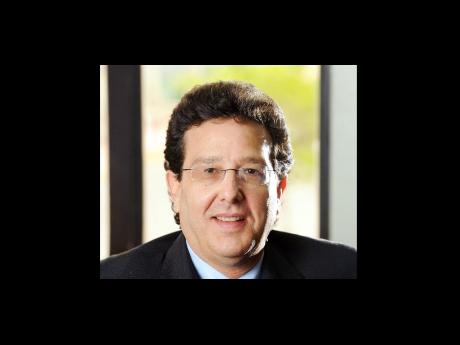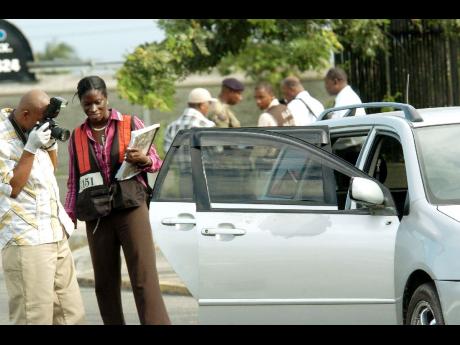'Only the toughest measures will suffice'
Joseph M Matalon, Contributor
The following is an excerpt from a speech delivered at the luncheon of the Insurance Association of Jamaica, Wednesday, May 19, by Joseph M Matalon, president of the Private Sector Organisation of Jamaica.
In August of last year, just a few weeks after assuming the presidency of the PSOJ, I had the opportunity to make remarks on the occasion of a regularly scheduled Chairman's Club Forum at which the prime minister provided the keynote address. I suggested in those remarks, that long before the collapse of Lehman Brothers in September 2008, the cumulative effect of past policy choices had been propelling us inexorably towards our very own home-grown economic crisis, and that the time had come to tackle, once and for all, those difficult decisions that faced us as a country.In the 10 months since that time, we have been encouraged by the series of actions taken by our Government in order to achieve hoped-for macroeconomic stability, a condition precedent for any resurgence of growth in the local economy.
The Government has announced a series of policy measures aimed at reversing the cycle of chronic fiscal deficits, high real interest rates, high debt and low growth that has characterised our economy for decades;
A major domestic debt exchange has been consummated that is generally recognised both locally and internationally to have been one of the most successful such transactions ever undertaken anywhere in the world, and which provides an opportunity to break the cycle of an ever-expanding national debt;
We have signed a standby arrangement with the International Monetary Fund that has catalysed unprecedented multilateral support for the Government's medium term economic programme;
Interest rate and exchange rate markets have subsequently remained stable with a notable absence of capital flight and the emergence of a more positive perception of our economic prospects;
We have received word that Jamaica has met all of the quantitative criteria under the IMF programme, as at the March 2010 quarter and, importantly, without the need for any waiver.
Added to all of this are the very positive economic trends emerging in the economies of Jamaica's main trading partners and which will likely have positive knock-on effects in our own economy over the balance of this fiscal year and beyond.
Based on this recent record of performance, clearly, congratulations are in order for our minister of finance and his technical team.
I want to turn now to those matters that have prompted such unprecedented outpourings of public anguish over the past days and weeks, and which have threatened to undermine the positive economic trends that I outlined earlier in my remarks. Indeed, it struck me, in preparing these remarks, that much of the language that I used back in August of 2009, to characterise the then crisis of the day, could equally well apply to the current crisis arising out of the extradition and Manatt Phelps & Phillips affairs. For, in fact, the specifics of these issues, about which so much has been written and said, are really only symptoms of a deeper underlying national crisis rooted in the choices we have made as a people over many years:
The choice we have made to turn a blind eye to escalating criminal violence;
The choice we made to accept as part of the status quo the acknowledged links between our political actors and organised-crime elements in our society;
The choice we have made to elect successive governments without holding their 'feet to the fire' in implementing the promises made in the heat of election campaigns.
The choice we have made to accept half-hearted and under-resourced attempts to reform our justice and national security systems;
And we could go on.
Indeed, long before any of us became aware of the extradition dispute between the US and Jamaica, and long before Manatt, Phelps & Phillips became a household name, locally, the cumulative effects of these past choices have been moving us towards the crisis that we are now witnessing:
1. The vacuum created by the state in our so-called garrison communities that has led to the dependence of the population on the 'dons', and created social conditions that breed ever more violence.
2. The significant trust deficit in our society. The UWI's Leadership and Governance polls over the past several years have revealed consistently high levels of interpersonal distrust within the Jamaican society (more than 80 per cent ).
3. An intolerably high level of crime and violence that is getting worse, committed by mushrooming gangs of criminals that act with impunity, committing the most heinous crimes and, for the most part, getting away with it.
4. A culture of corruption that has placed Jamaica on the map for being one of the more corrupt societies in the world, ranked at 99 out of 180 countries rated by Transparency International. Professor Trevor Munroe is quoted as saying, "One out of four Jamaicans has reported having been exposed to some form of corruption", a figure that is more than twice the global average.
So where do we go from here? I am sure that most, if not all, of you in this room will agree with me that the events of the past several weeks, and more particularly, of the last few days, have provided ordinary Jamaicans like you and me the unique opportunity to take back our country and help shape its future.
We have found our voices and now is the time for all stakeholders - the Government, Opposition, private sector, the labour movement and civil society, to muster the courage to hold each other's hands and build consensus around some key actions that will put us on the path to achieving our vision for our beloved isle:
1. First, we must set about the process of rebuilding trust in the society. In his speech on the evening of May 17, our prime minister acknowledged that the calls for his resignation had much to do with the fact that so many of our citizens said they could no longer trust him. He has asked for our forgiveness and has pledged to do everything in his power to regain our trust in him.
As you know, prior to the prime minister's catharsis, the private sector had requested suspension of the agenda of the last meeting of the Partnership for Social Transformation in order to discuss these very issues. The PM's mea culpa now sets the stage, I believe, for a continuation of these talks and for more focused action on many of the issues to which the PM has given the nation specific commitments. You may rest assured that The PSOJ will insist on deadlines for these commitments and keenly monitor their implementation to ensure that the prime minister is true to his word.
2. We must use this opportunity to create a sea change in our society, not just at the level of government, but in our own organisations as well. As members of the private sector, we must acknowledge our own complicity in many of the ills faced by our nation. In addition to a commitment to acting as good corporate citizens - obeying the laws of the land and paying our taxes - we must resolve to no longer "turn a blind eye", and to ensure that our voices are heard in holding our national leaders to account for the commitments that they have made.
3. Like the successful JDX, Jamaica needs a 'game changer' in our approach to tackling the crime and violence, which risks destabilisation of our fragile economy. We must now take decisive steps towards dismantling political garrisons. we must make it clear to our political directorate that they must commit to ceasing the award of State contracts to organisations with reputed criminal partners and associates and to stop accepting donations from such individuals and tainted entities.
As a demonstration of good faith and transparency, both political parties should commit, at the very least, to annually turning over their list of contributors to the political ombudsman to show that they are not receiving contributions from known or reputed criminals, and are therefore not beholden to these characters. We must quickly enact the crime bills for which The PSOJ has advocated for over two years and which have been languishing in the Parliament while our murder rates soar.
These must include:
a. Strengthening wiretapping legislation to allow the intelligence collected in judicially authorised wiretappings to be more readily entered as probative evidence in court;
b. Amending the Bail Act to broaden the considerations for denial of bail to persons who have committed serious and heinous crimes;
c. Passing omnibus post-arrest processing legislation to permit fingerprinting and photographing of all persons charged with violent offences and for the collection and storage of DNA of persons charged with violent offences and for repeat offenders;
d. Implementing tougher, more effective RICO-type anti-gang legislation than what has been proposed by our minister of national security. Given the threat to the very existence of the Jamaican State presented by the mushrooming growth of criminal gangs, The PSOJ believes that only the toughest measures will suffice.
There is much to be done and it is understandable if some among us feel a sense of hopelessness and disillusionment. But we have within us, I believe, the power to use our collective hands and hearts to take back our nation from the brink of anarchy. I close this presentation as I did on August 11, 2009, with a timeless quotation from Shakespeare, that I believe is as appropriate in the current circumstances, and which I again commend to our Government, our loyal Opposition, our private and public sectors, our labour union movement and, indeed, to every individual who counts himself or herself a committed Jamaican.
That quotation goes as follows:
"There is a tide in the affairs of men
Which, taken at the flood, leads on to fortune;
Omitted, all the voyage of their life
Is bound in shallows and in miseries.
On such a full sea are we now afloat,
And we must take the current when it serves,
Or lose our ventures."


